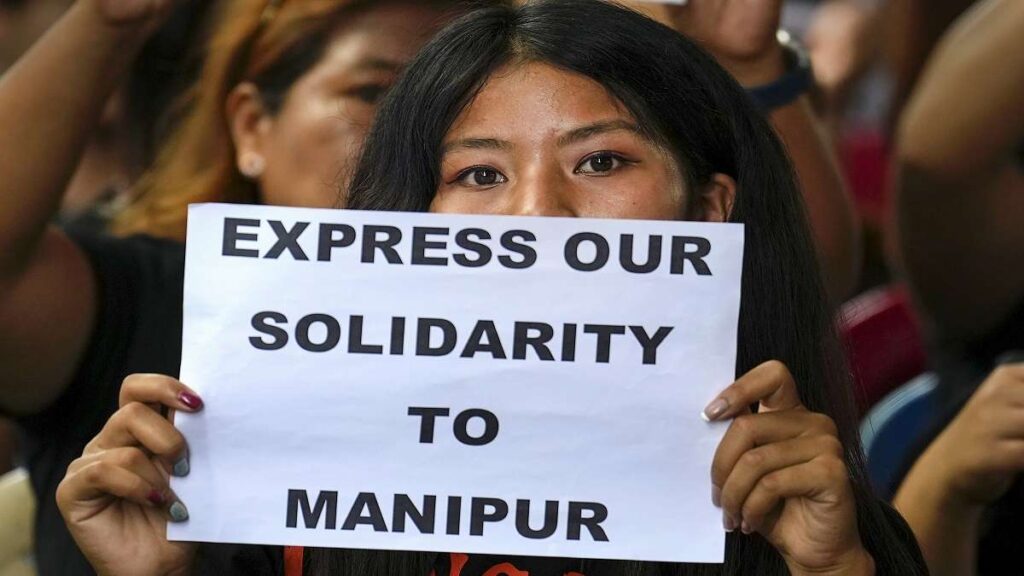A documentary shedding light on the harrowing violence in Manipur found an unexpected yet poignant venue for screening: a church in Kerala under the Syro-Malabar Church. This unprecedented event underscores the power of art and storytelling to transcend geographical boundaries, unite communities, and provoke meaningful dialogue on pressing social issues.
The documentary, which chronicles the tragic events that unfolded during the violent conflict in Manipur, offers a sobering glimpse into the lives of those affected by the turmoil. Through poignant narratives, gripping visuals, and firsthand testimonies, it unravels the complex layers of socio-political unrest, human rights violations, and the resilience of the people amidst adversity.
The decision to screen the documentary within the premises of a Syro-Malabar Church in Kerala, a state geographically distant from Manipur yet spiritually connected through shared humanity, reflects a profound act of compassion and solidarity. It underscores the church’s commitment to social justice, peace-building, and fostering empathy and understanding among its congregation.
The screening of the documentary in a church setting also serves as a poignant reminder of the church’s role as a catalyst for social change and moral awakening. By providing a platform for voices that are often marginalized or silenced, the church fulfills its mission of advocating for the oppressed, amplifying their stories, and mobilizing support for justice and reconciliation.
Moreover, the screening of the documentary within the Syro-Malabar Church resonates with the church’s rich tradition of social activism and engagement with contemporary issues. Inspired by the teachings of Christ and the values of compassion, justice, and solidarity, the church actively participates in efforts to address systemic injustices, promote human dignity, and build a more equitable and peaceful society.
The event also highlights the power of collaboration and solidarity across diverse communities and regions. While Kerala and Manipur may be separated by geographical distance and cultural differences, the screening of the documentary serves as a powerful reminder of the interconnectedness of human experiences and the universal quest for justice and dignity.
Moreover, the documentary screening within the Syro-Malabar Church underscores the importance of using art and storytelling as powerful tools for social change and advocacy. Through the medium of film, the documentary sheds light on the lived experiences of individuals affected by violence and injustice, evoking empathy, understanding, and a sense of shared humanity among viewers.
The screening of the documentary in a church setting also opens up space for dialogue, reflection, and collective action. Following the screening, attendees have the opportunity to engage in discussions, share their perspectives, and explore ways to support the cause of peace and reconciliation in Manipur and beyond.
However, the event has not been without controversy. Some critics have raised concerns about the appropriateness of screening a documentary on a politically sensitive issue within the premises of a religious institution. They argue that churches should refrain from engaging in political matters and instead focus on spiritual guidance and pastoral care.
In response to these concerns, supporters of the screening emphasize the importance of the church’s role as a moral voice and advocate for justice in society. They argue that the issues highlighted in the documentary transcend mere politics and speak to fundamental questions of human rights, dignity, and the pursuit of peace. By providing a space for dialogue and reflection, the church fulfills its mission of accompanying people in their struggles and journey towards healing and reconciliation.
In addition, the screening of a documentary on Manipur’s violence within a Syro-Malabar Church in Kerala signifies a powerful act of solidarity, compassion, and advocacy. By amplifying the voices of those affected by violence and injustice, the church reaffirms its commitment to social justice, peace-building, and the promotion of human dignity. As communities come together to watch, reflect, and engage, the event serves as a poignant reminder of the transformative power of art, storytelling, and collective action in the pursuit of a more just and compassionate world.


